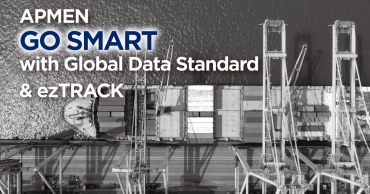
Asia-Pacific Model E-Port Network (APMEN)
Building the Foundation for The China (Shanghai) Free Trade Zone Cross-border Supply Chain Product Traceability Platform
“GS1 global data standards support China to connect with the world, I hope once the project is executed, it will improve the efficiency of data connectivity between the members’ ports, enhancing cross-border supply chain traceability and thus the trade and economic growth.”
Mr. David Zheng, Senior Manager
Background
The China (Shanghai) Free Trade Zone (FTZ) Administration Bonded Area Bureau hopes to build a cross-border open data platform, which can connect the e-port, single window and supply chain information portal in Shanghai with those in other countries, therefore commissions Asia-Pacific Model E-Port Network (APMEN) to undertake a cross-border supply chain product traceability platform project in the FTZ.
Integrated with emerging technologies like big data and blockchain, the project involves setting up traceability data standards for products crossing the borders to realise import/export traceability data exchange. By mapping the supply chain service provider from the import/export region, the project targets to capture end-to-end cross-border product data, ultimately providing traceability data enquiry services for relevant enterprises, consumers and regulators in the region.
Solution
APMEN invited GS1 Hong Kong (GS1 HK) to define and develop the cross-border traceability data standards for the FTZ. Based on the global GS1 systems of standards, the development work includes object identification standard, data capturing standard, data sharing standard (GS1 EPCIS), and standard implementation guideline. It covers details on the GS1 identification keys, basic and extended coding requirements, fitted for cross-border supply chain traceability application.
EPCIS is a global data standard that defines critical tracking events along the supply chain to describe the “WHAT, WHERE, WHEN, WHY”, and turns those events into data to be captured and shared across supply chain stakeholders. The standards and guideline developed by GS1 HK become the foundation for platform development facilitating cross-border trade.
The project is expected to finish by the end of 2020.
GS1 standards used or solution (s) / service (s) applied
• Global Data Standard
• Electronic Product Code Information System (EPCIS)
Benefits
1. Provide a reliable standard foundation for the traceability data of cross-border import/export trade items;
2. Achieve end-to-end data identification, capturing and sharing of cross-border goods;
3. Able to offer traceability data enquiry services for all supply chain stakeholders in the future.
About the Company
Asia-Pacific Model E-Port Network (APMEN) was launched at the 22nd APEC Economic Leaders Meeting (AELM) in November 2014, as a regional cooperation initiative to promote trade facilitation and supply chain connectivity. In August 2015, APMEN Operational Center (AOC) was set up in Shanghai. So far, APMEN has 19 members from 11 APEC economies.









